Further to the discussion on time zones and changing the clocks, I’ve always wondered why we have never properly attempted to decimalise time unlike most other things during the industrial revolution. Doing it now would probably be totally unworkable due to business practice and culture that has built up around the 24 hour clock, but I’m wondering if it could have worked in the past before the adoption of the Standard time zones as we know them today.
I spent quite a bit of time working this out a few months ago, but I figured out that you could split a solar day and night cycle into 20 decimal hours if you apply the following principle:
1 minute = 100 seconds
1 hour = 100 minutes
1 day = 20 hours
1 week = 9 days
1 month = 4 weeks
1 year = 10 months
I spent quite a bit of time working this out a few months ago, but I figured out that you could split a solar day and night cycle into 20 decimal hours if you apply the following principle:
1 minute = 100 seconds
1 hour = 100 minutes
1 day = 20 hours
1 week = 9 days
1 month = 4 weeks
1 year = 10 months
- 1 decimal minute (100 decimal seconds) would be equivalent to 43.2 seconds in current time
- 10 decimal minutes (1000 decimal seconds) would be equivalent to 7 minutes 12 seconds (432 seconds) in current time
- 1 decimal hour would be equivalent to 1 hour 12 minutes in current time
- 10 decimal hours would be equivalent to 12 hours in current time
- A decimal day is made up of 20 decimal hours - 10 for am and 10 for pm
Attachments
-
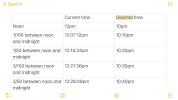 8629E2CC-E9AF-4ECB-B786-14AC5893C654.png81.4 KB · Views: 24
8629E2CC-E9AF-4ECB-B786-14AC5893C654.png81.4 KB · Views: 24 -
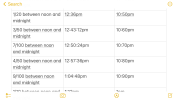 335BE272-8406-4993-AE3C-D4ED36BBD3FE.png86.9 KB · Views: 25
335BE272-8406-4993-AE3C-D4ED36BBD3FE.png86.9 KB · Views: 25 -
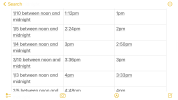 44BF1C0F-7E08-468D-B316-E5FFC40839E5.png81.3 KB · Views: 21
44BF1C0F-7E08-468D-B316-E5FFC40839E5.png81.3 KB · Views: 21 -
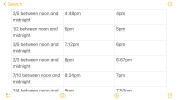 4A84D6EF-7C56-4693-B88B-FDC9107E046F.png82.4 KB · Views: 19
4A84D6EF-7C56-4693-B88B-FDC9107E046F.png82.4 KB · Views: 19 -
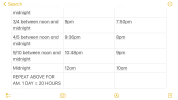 584D5EB3-C75F-40D1-A774-F2C9A838FBA5.png77.9 KB · Views: 25
584D5EB3-C75F-40D1-A774-F2C9A838FBA5.png77.9 KB · Views: 25
